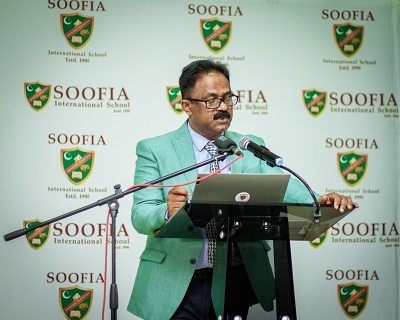By: Thandiwe Kubere
Soofia International School in collaboration with stakeholders in the education sector, held the Soofia International Independence Symposium, which deliberated on the implementation of Lesotho’s revised secondary education. The school’s 5th Symposium was held at Mojalefa Lephole Convention Center in Maseru.
The Symposium was structured revising Lesotho’s current secondary curriculum. This plan was founded to reach the ever evolving world, as well as to find ways of solving the evident economic challenges, and produce learners who can easily adapt anywhere in the world to meet their dreams.
Opening the ceremony with the background information on the subject matter, Soofia International School’s Principal, Mr. Bhaskaran Vijayakumar declared the landscape of education stands at a pivotal crossroad, more especially in Lesotho. He said, “As we stand on the precipice of an uncertain future, where jobs, technologies and challenges are yet to unfold. The urgency to reevaluate our education system becomes paramount.”
He remarked that the symposium was not meant to meet just as representatives of Soofia International School, but as advocates for a crucial discussion- the role of education as a safeguard of Lesotho and its people in an era of unparalleled change and unforeseen possibilities.
“At this juncture, it is essential to consider if a four year post primary curriculum which ends in grade 11 adequately serves our students. Is it sufficient to equip the learners with skills and knowledge necessary for the competitive future?” he asked.
Mr. Vijayakumar noted that according to the education sector plan, released by the Ministry of Education and Training in August 2016, the year when subsidiary level was expected to be introduced by 2021. However, it has not been implemented yet and there are no clear reasons as to why that is the case and what happened to it. The arrangement of completing pre-university education in just four years of post-primary might fall short of preparing adequately.
He stated that failure to have implemented this plan as scheduled has compromised the standard of our learners to qualify for university entrance. He continued that this is important as this would bring our education system to a relevant and competitive standard at the world stage.
“The implications of such an incomplete curriculum could mean a compromised foundation for higher education and a limitation on their global competitiveness. Lesotho’s education standards directly impact our standing in the international arena”, he said.
He further enlightening that falling behind in education not only adversely affects individual opportunities but also hinders the country’s progress compared to other nations. The global landscape prioritizes nations with robust education systems.
“And our commitment to offering quality education is integral to ensuring our nation’s relevance and competitiveness on world stage. This brings us to the crucial theme of our symposium today: Education, a better safeguard of Lesotho and its people. Education serves as a cornerstone of the nation’s prosperity and stability. It is not merely about academic qualifications, rather, it is a bedrock upon which the future of Lesotho rests”, affirmed Vijayakumar.
It was therefore, put upon the nation to ask these lingering questions; “where are those learners who completed LGCSE back in 2022 and those who sat for their 2023 final examinations? Learners that are in institutions of higher learning, what criteria was used for their admission, and lastly, what impact will the delay in implementation have on the status quo of our education quality and the economy?”
In an attempt to answer these questions, Associate Professor Mohaeka Raselimo, PhD Dean of the Faculty of Education and Geography Education, presented all the possible scenarios that led to the delay in implementing this plan.
Giving his remarks, Mr. Raselimo stated that as he reflected on the topic at hand, he concluded that Lesotho’s curriculum reform landscape is characterized by continuity rather than change. He revealed that the reasons to this case are different, one of them is that there are often contradictions in the implementation of the educational policies and this is because they are not coherent, therefore causing a lot of confusion when it comes to implementation.
“We need to fix the situation urgently, more so if we undertook to embark on this large scale reform of revamping the upper level of secondary education, and also attempted to make changes like revising the LGCSE programme from five years to four years. This was so that those following the academic stream could do the fifth year in Advanced Subsidiary programme, but that has not happened to date”, he said.
“When you establish a frame without considering the inner frame; learners and teachers, there are coherences expected, as thus, the revised plan has been delayed as it reflects different” highlighted Dr. Thabiso Nyabanyaba, Director of Planning and Mathematics Educator, NUL.
The Cambridge programmes which were advised to be adopted, described to be particularly helpful to students, especially those who have hope of furthering their studies abroad were; Year 1: Advanced Subsidiary (AS) and Year 2: Advanced Level (A Level). This qualifications were assured to have been taken by over 175 000 learners in nearly 130 countries every year. They are typically for learners who are between the ages of 16 and 19, who need advanced study to prepare for higher learning. This programmes assist students in becoming confident, responsible, and reflective and engaged in their studies.


